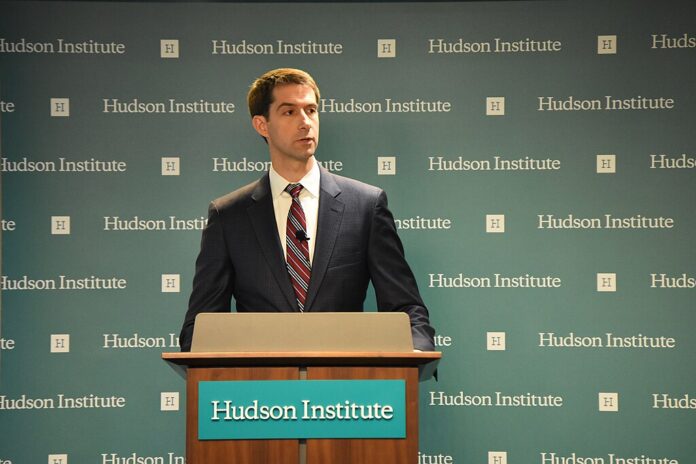Senator Tom Cotton continues to back Donald Trump’s actions during a contentious Arlington national cemetery visit, despite his previous written standards for conduct at the site.
Senator Tom Cotton (R-AR) has reaffirmed his support for former President Donald Trump’s controversial visit to Arlington National Cemetery, where Trump took photos with military families in a restricted area known as Section 60. This stance comes despite widespread criticism and allegations of misconduct related to the visit.
The controversy erupted when Trump attended a wreath-laying ceremony honouring 13 service members who lost their lives during the U.S. withdrawal from Afghanistan in 2021. Among the fallen was Marine Staff Sgt. Taylor Hoover, whose grave is located in Section 60. Trump posed for photos with Hoover’s family, an action that has sparked significant debate.
Embed from Getty ImagesDuring a heated interview on Meet the Press, host Kristen Welker questioned Cotton about whether Trump’s actions constituted a breach of regulations. The Trump campaign has claimed that permission was granted for filming, a statement contradicted by the cemetery and defence officials. The situation was further complicated by an alleged altercation between cemetery staff and Trump’s team, which the Trump campaign has also denied.
In his response, Cotton took to X (formerly Twitter), defending Trump’s visit by shifting focus to the broader context. “13 brave Americans were killed in Afghanistan three years ago because of Joe Biden and Kamala Harris’s failure to plan for a withdrawal,” Cotton wrote. He praised Trump for honouring the fallen soldiers and criticized the current administration’s handling of the situation.
Cotton continued to support Trump in a Sunday interview with NBC, insisting that Trump did not use the visit for campaign purposes. He argued that the families of the fallen soldiers invited Trump and requested the photos. “They wanted President Trump there. They wanted to take those photos,” Cotton asserted. He dismissed concerns about Master Sergeant Andrew Marckesano’s gravestone appearing in the background of the photos, stating that the headstones are closely positioned and that the focus was on honouring the families.
The senator’s defence of Trump stands in stark contrast to his previous stance on proper conduct at Arlington National Cemetery. In his 2019 book, Sacred Duty, Cotton, who served with The Old Guard at Arlington, outlined his views on respectful behaviour at the site. “Although a sign welcomes visitors to ‘our nation’s most sacred shrine,’ no rules are posted. Yet visitors somehow understand a proper code of conduct,” Cotton wrote. His current defence of Trump’s actions appears to diverge from the standards he once advocated.
Cotton’s position has sparked accusations of hypocrisy, as critics argue that his defence of Trump contradicts his earlier principles regarding the sanctity of Arlington National Cemetery. The senator’s deep connection to the cemetery, due to his service with The Old Guard, adds a layer of irony to the situation.
Analysis:
Political:
Tom Cotton’s defense of Trump highlights a complex political landscape where partisan loyalties often outweigh principles. By backing Trump’s controversial actions, Cotton aligns himself with the former president’s base, potentially to secure political support or maintain influence within the party. This alignment underscores the tension between personal principles and party politics, especially in the context of high-profile controversies.
Social:
The controversy over Trump’s Arlington visit reflects broader societal debates about respect and propriety. The polarized reactions to the visit illustrate how public figures’ actions are scrutinized through the lens of social values and expectations. Cotton’s defence may resonate with supporters who view the visit as a gesture of respect, while critics see it as a violation of sacred norms.
Racial:
The racial implications of the controversy are less direct but can be contextualized within broader discussions of how different communities perceive respect for military service and national symbols. The focus on the appropriateness of the visit touches on themes of honor and sacrifice, which are significant across racial lines, though not explicitly addressed in this case.
Gender:
Gender dynamics are not explicitly addressed in the current controversy, but the broader implications of respect for military personnel and public conduct intersect with gendered expectations of leadership and dignity. Female and male voters may respond differently to the handling of such controversies, influenced by their perceptions of propriety and respect in public figures.
Economic:
The economic impact of this controversy is minimal directly, but it could influence political stability and public trust in leadership, which in turn affects economic confidence. Political controversies can have ripple effects on the business environment and investor confidence, though this specific incident is more about public conduct and political loyalty.
